What Happens When You Turn Yourself In for a Bench Warrant?
Turning yourself in for a bench warrant means that you will appear before a judge, participate in a court hearing after which the warrant will likely be recalled.
 Written by Background Check Repair
Written by Background Check Repair
Criminal Records | April 29, 2024
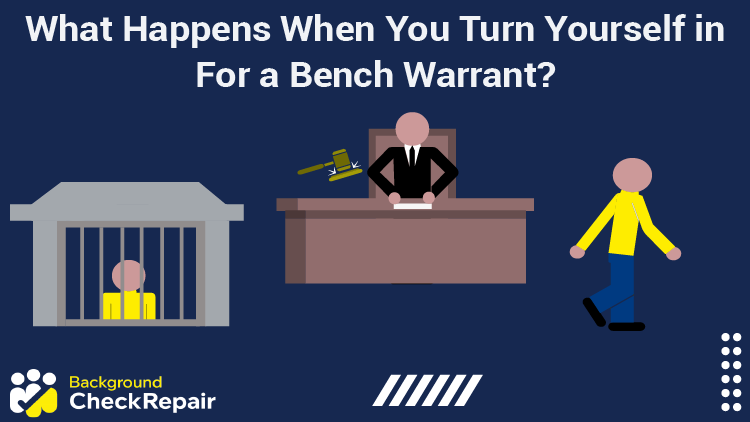
Table of Contents
Many types of warrants can stick around forever since they don’t expire, but what happens when you turn yourself in for a bench warrant?
Should you just pay some money to clear it…is it even possible? Can you just pay it and be done?
That all depends on a number of factors, as well as whether the bench warrant was issued in relation to a criminal or civil court matter.
If you’re wondering whether a warrant of arrest is out for you, the first step is to verify the warrant is active. A basic warrant search can be done swiftly using an online tool or through the local sheriff’s office.
However, this complete guide outlines what happens when you turn yourself in for a bench warrant, as well as the consequences that come with other types of warrants and the best course of action
Lawyers and criminal defense attorneys will always recommend that you hand yourself over to the police, but what happens when you turn yourself in for a bench warrant?
First of all, you will have to appear in front of a judge and state your reasons for violating the initial court order. Depending on the outcome of this court appearance, the following may happen:
It is possible to avoid spending time in jail, but you cannot clear a bench warrant without appearing in court.14
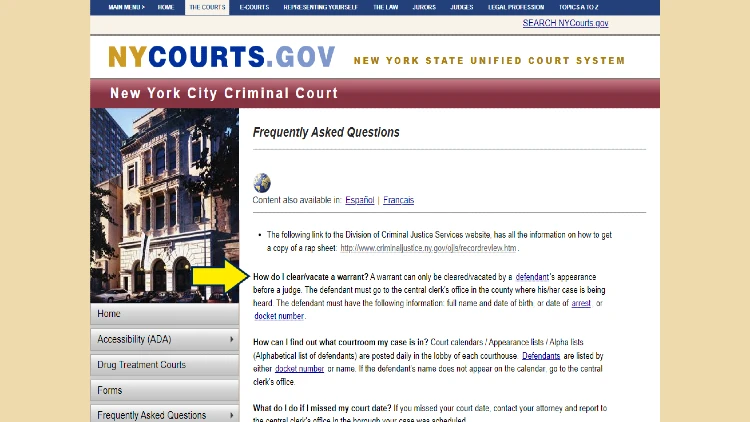
Most states’ court websites offer information about types of warrants and the process for clearing or vacating a bench warrant, if possible.
Should you be taken into custody, you may be given the option to post bail. However, if the judge is of the opinion that you are a flight risk, or if it becomes apparent that you have a serious criminal history, you will not be given the option to post bail.2
While it may be scary to think of handing yourself over to the police, it is always best to cooperate with authorities, after consulting an attorney.
What results if you turn yourself in for a bench warrant, is that you will pay a bond amount, or the warrant may even be recalled.
This is especially likely if the judge sees that you are being cooperative.
Don’t think about the process too much – instead, get in touch with an attorney and let them assist you.
You will either be required to pay money that you owe for a fine (or other costs), if a cost warrant was issued, or you will be required to pay the bond amount on a bench warrant as set by a judge.
Before turning yourself in, you should study the warrant you have been issued with to ensure that you know exactly what you are being charged with. An attorney can assist with translating terms with which you are not familiar.
If you are charged with a misdemeanor or a felony, the attorney will guide you through all the steps and plead your case in court.
Whether you have an attorney or not, you should consider all the consequences of turning yourself in for a warrant.15 For instance, if you can prove that you don’t have the money to pay for a criminal defense lawyer, you will be allowed to apply for the services of a public defender at a fraction of the cost.
Keep in mind that a public defender will only be appointed by the court if you can definitively prove that your current financial situation doesn’t allow for the hiring of a private attorney.
Furthermore, if your warrant is related to a misdemeanor or a felony, you will definitely require legal assistance. Should a bond be applicable to your case, you will have to pay a bondsperson as well.
There is light at the end of the tunnel though because many types of warrants can be quashed without having to serve jail time.3
While your list of priorities may not include the best time to turn yourself in for a warrant, there are specific days you can choose to limit the amount of time you spend in jail.
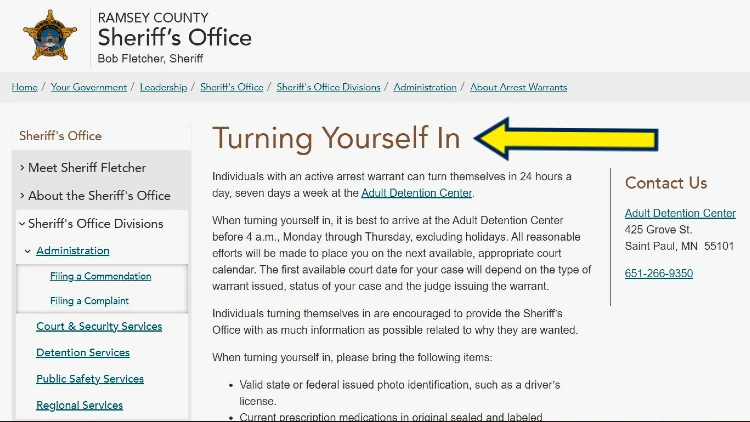
Each county and jurisdiction offers advice for how to turn yourself in for a bench warrant or an arrest warrant, and outlines when the hearing can be expected.
Lawyers agree that the best time to hand yourself over to the police is between Tuesday and Thursday, as early in the morning as possible.4
Turning yourself in without a warrant means going to the local police station before an officer arrives at your door, ready to arrest you. But should you really do this?
It all depends on whether you have an attorney on your side and what your criminal history looks like.16 If your existing record is going to count against you, it is best that you arrange with your attorney to negotiate a time during which you can hand yourself over.5
Someone once saw a judge sitting on a bench while writing out a warrant, and the term ‘bench warrant‘ was born.13
Of course, it didn’t happen exactly like that, but the name was really derived from judges who complete warrants while presiding on a bench.
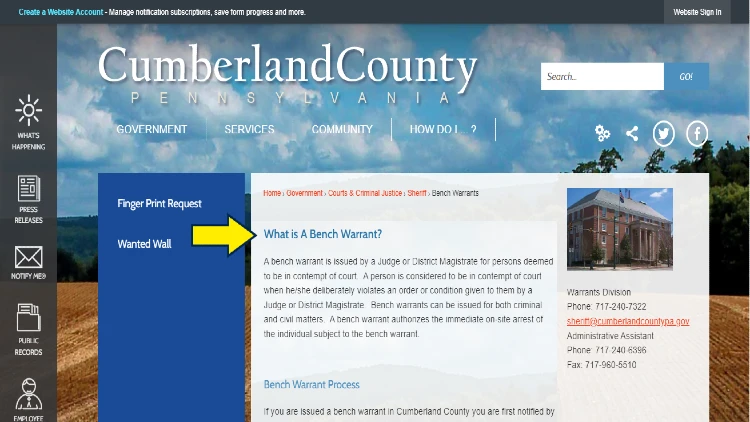
Bench warrants can be issued for failing to show up to court, violating the terms of a previous court order, or a number of other factors.
A bench warrant is typically issued whenever an individual fails to honor a court appointment, or if they fail to pitch up for jury duty after being summoned.
Bench warrants can be either criminal or civil and only come into play when a person is arrested for violating a court order. Should the person again fail to arrive for their appearance before a judge, they will be declared to be in contempt of court.
Finding out that you have an outstanding warrant can be terrifying, and you may be asking yourself: if you have a warrant can you just pay it?
Unfortunately, clearing a bench warrant isn’t as easy as opening your wallet, and will most likely involve an attorney as well as a court appearance.
Once you have been in front of a judge, you may be able to pay the bond to stay out of jail. However, if your warrant is of the no-bail variety, jail time will definitely be on the cards.
If you know that you have outstanding warrants, you should present yourself to a court clerk or your nearest police station and pay the applicable bail amounts. You should note that for the vast majority of cases, you will have to appear in court to clear your warrants.
There are several reasons for issuing a warrant, including:
Texas law (Penal Code 38.10) states that it is illegal to miss a court appointment, either before or after a bench warrant has been issued. When you are eventually convicted, the penalties may include a felony charge.
You will be allowed to enter a defense if you missed a court date, but your excuse cannot be that your lawyer advised you not to go to court or that you had another court appointment at the exact same time.
A bench warrant could possibly be cleared if your lawyer is able to resolve the original violence in court. However, this process must take place before the bench warrant is executed.
When asking if background screenings reveal warrants, the answer is typically no, but they can appear in certain situations.
What happens when you turn yourself in for a bench warrant, is likely going to happen with other warrants as well.
Should you have a misdemeanor charge against you, and you decide to violate the terms of your misdemeanor probation, an arrest warrant will be issued against you. Again, it is better that you turn yourself in before you are arrested.
Turning yourself in means that you can contact the courthouse and ask for an arraignment. This is the best course of action if an arrest warrant has been issued in relation to criminal charges against you.
The arraignment will serve as your initial court hearing during which you can enter your desired plea and find out when your next court appearance will be. However, if you don’t turn up for the next appointment, a bench warrant will be issued, and you will be arrested.
If a misdemeanor arrest warrant has been issued,17 but no criminal charges have been filed against you, you should also consider turning yourself in to the police. It is important to bring along your identification documents as well as money in the event that you are given a bond.
As with other warrants, it is best that you get an attorney to help you through the process of handing yourself over.6
For individuals asking whether a citation can appear on their records, receiving an auto citation after breaking traffic laws, means the incident will be added to your driving record and stay there for up to five years depending on the state.
Turning yourself in for probation violation should be your first step when you are informed of a probation warrant.
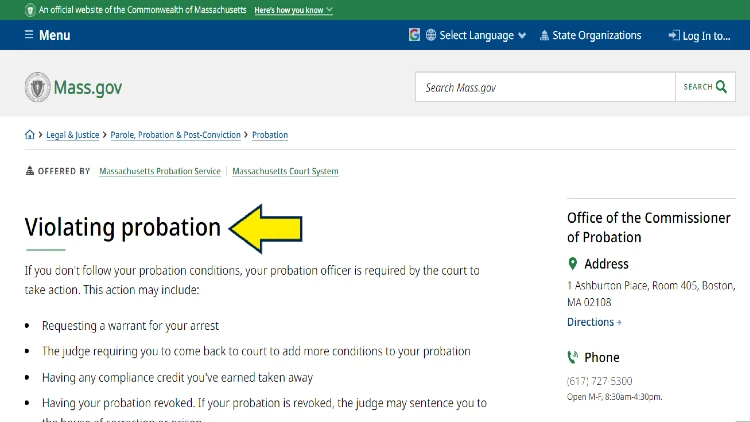
Probation violations can also result in a warrant, and each state outlines the conditions that violate probation on the government or law enforcement website.
The most common reasons for issuing a warrant include:
Once you turn yourself in, you will be arrested, and an arraignment will be scheduled.
For those wondering whether contempt of court is documented on your criminal history, the answer is yes. If you are found to be in contempt of court, it will be added to your criminal record.
If you don’t have a criminal record at the time, one will be created.
The concept of probation originated during the Middle Ages.
During that time, cruel punishments were inflicted on both adults and children for the smallest offenses. These punishments included execution and torture.
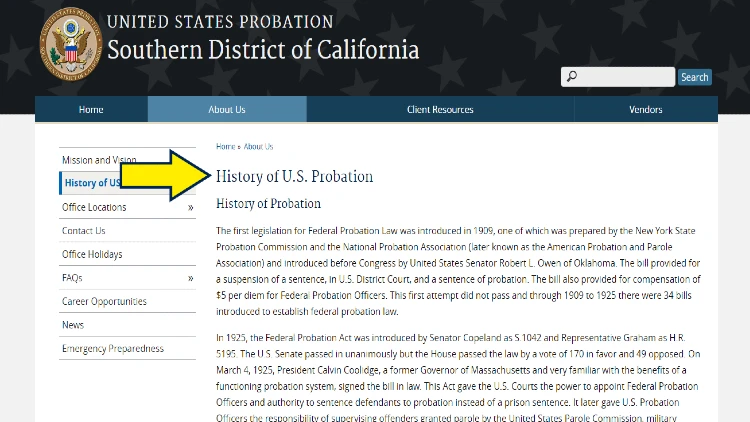
Probation is a historic concept, which has been modified over the centuries into modern laws.
During the reign of King Henry VIII, the death penalty would be handed to people found guilty of one of over 200 different crimes, most of which were not serious.
It took a long time, but eventually, a concerted effort was made to put an end to these barbaric practices. Starting with royal pardons, the process of releasing prisoners for good behavior was finally established.
The first probation officer was John Augustus, who by 1858 had provided a way out of prison for almost 2,000 people. Not long after Augustus died, the first probation statute was included in Massachusetts law in 1859.
Even if you find yourself on the right side of the law, it is good to be able to know how to determine if a person has a probation or criminal record.
For example, say you start an online relationship and somewhere along the way you begin to suspect that the person you are conversing with is not all they’re pretending to be. There are several ways to check whether this person is on probation and whether they have a serious record of offenses.
Probation records are freely available and can be found online, at a courthouse, or at a police station.18 When searching online, you should perform a county website check, as well as a ‘per state’ search.
If these searches don’t produce results, you could call in reinforcements in the form of third-party services or even a PI.
Additionally, you could make use of the ‘offender network’ system which is a database that is related to correctional services departments. Lastly, the state records website also comes in handy when trying to find records in different states.19,8
You will most likely be arrested if someone lays a charge of domestic violence against you, so turning yourself in might be the better option.
If you turn yourself in, you will be taken into custody and put in jail until your first court appearance. During this time, you will likely have a restraining order issued against you and your firearms will be confiscated.
Domestic violence is a scourge that affects both the rich and the poor. In contrast to popular belief, domestic violence doesn’t only extend to gender-based abuse directed at a spouse or partner.20 It also includes the following circumstances:
Should you be charged with domestic violence, the best option is to turn yourself in. You can expect the following once you start the process:
The California Penal Code that deals with domestic violence charges is Section 273.5 pc2.
This code deals with harm done to any person who was once in a relationship with another person who has been accused of domestic violence.
If you, for instance, have an outstanding bench warrant and you are arrested, you may be wondering how long do you stay in jail for a warrant?
You could stay in jail until your case is heard in court. This could take several months, and if you are convicted of the original charge, you will spend even more time in jail.
A warrant that has been executed means that you must appear in front of a judge within days. If you are convicted of contempt of court, you might spend up to six months in prison.
The same jail time applies to a conviction of failing to appear in court for a misdemeanor warrant. If you are convicted of failing to appear in court for a felony charge, you may spend up to three years in prison.
Turning yourself in after sentencing processes have been completed, simply means that you have to immediately report to the police station.
If it involves prison time, you will be held in custody until you are transported to the relevant prison. This also means that you will be taken to your cell straight away.
Should the sentence involve specific conditions such as probation or mental treatment, you must contact the police to arrange for supervision or entry into a treatment program.11
Failure to turn yourself into jail after sentencing means you will be arrested. When you appear in court again, more time will likely be added to your existing jail term.
If you have an outstanding warrant and you decide not to turn yourself in, you will eventually be arrested. If you are summoned to appear in court and you fail to turn up for the appointment, a bench warrant will be issued, and you will be arrested.
Also, not turning yourself in means you can be arrested anywhere, including at home in front of your family or at work in front of your colleagues. Your lawyer is likely to advise you to turn yourself in, to spare yourself this humiliation.
If you’re considering the pros and cons of turning yourself in, you might be wondering: does turning yourself in reduce your sentence?
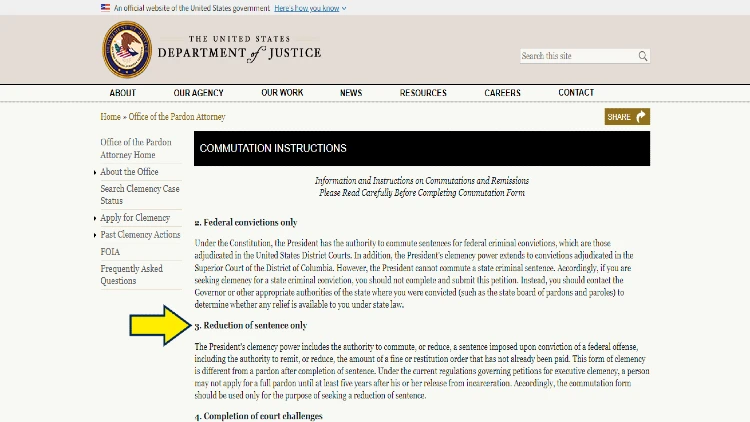
Commutation is generally at the sole discretion of the executive public official in office.
Unfortunately, there is just no guarantee that making the first move will lead to a lesser sentence.
There are many benefits to turning yourself in to the police, the least of which is sparing yourself and your family the humiliation of being arrested in public. Other benefits include:
Considering the above benefits, it becomes clear that instead of wondering what happens when you turn yourself in for a bench warrant or any other warrant, it is best to hire a lawyer and let them assist you in turning yourself in.
Turning yourself in for a bench warrant means that you will appear before a judge, participate in a court hearing after which the warrant will likely be recalled.
Information about probation and prior convictions may appear during a routine background check, but information about the actual arrest/s will not appear.
Probation warrants, and other warrants, are not likely to appear during background checks. They might, however, come up during intensive or level 2 checks.
Parole information might come up during a background screening, but it is usually limited to data that is 10 years old or less.
For those wondering whether a records check may reveal traffic warrants, it is very unlikely. However, they might pop up if the search is extensive.
1Aizman, D. (2021, December 9). The Complete Guide To Getting Your Bench Warrant Cleared. Aizman Law Firm. Retrieved from <https://aizmanlaw.com/get-bench-warrant-cleared/#0-how-to-remove-a-bench-warrant>
2Shouse Law Group. (2022, July 11). What happens when you turn yourself in for a bench warrant? Shouse Law Group. Retrieved from <https://www.shouselaw.com/ca/blog/what-happens-when-you-turn-yourself-in-for-a-bench-warrant/>
3Rodney OKC Bail Bonds. (n.d.). Turning Yourself In? 8 Things to Know Before You Go…. Rodney OKC Bail Bonds. Retrieved from <https://rodneyokcbailbonds.com/turning-yourself-in-8-things-to-know-before-you-go/>
4Kurtz & Blum, PLLC. (n.d.).Turning Yourself In. Kurtz & Blum, PLLC. Retrieved from <https://www.kurtzandblum.com/criminal-defense-attorneys/turning-yourself-in/>
5Denison, T. (n.d.). Should You Voluntarily Turn Yourself in to Police? – Tim Denison Law. Louisville Criminal Defense Lawyer. Retrieved from <https://www.timdenisonlaw.com/should-you-voluntarily-turn-yourself-in-to-police/>
6Shouse Law Group. (2022, April 15). Turning Yourself in for a Misdemeanor Warrant – How to do It? Shouse Law Group. Retrieved from <https://www.shouselaw.com/ca/blog/turning-yourself-in-for-a-misdemeanor-warrant/>
7Browning, T. (n.d.). 7 Common Probation Violations and Their Consequences | Browning & Long PLLC. Browning and Long. Retrieved from <https://www.browninglonglaw.com/library/common-violations-and-consequences-of-probation.cfm>
8Seidel, M., & Seal, J. (2020, January 22). How to Find Out If Someone Is on Probation? Legal Beagle. Retrieved from <https://legalbeagle.com/5643433-out-someone-probation.html>
9FindLaw. (n.d.). What is the Definition of Domestic Violence? FindLaw. Retrieved January 4, 2023, from <https://www.findlaw.com/family/domestic-violence/what-is-domestic-violence.html>
10Joslyn, B. (n.d.). Columbus Lawyer for Domestic Violence Warrants | Franklin County Ohio. Joslyn Law Firm. Retrieved from <https://www.criminalattorneycolumbus.com/criminal-defense/domestic-violence/domestic-violence-warrants/>
11Seth Kretzer. (2018, December 4). Sentencing Hearing | Do You Go to Jail Right After Sentencing? | Kretzer. Seth Kretzer. Retrieved from <https://kretzerfirm.com/do-you-go-to-jail-right-after-sentencing-hearing/>
12Kurtz & Blum, PLLC. (n.d.). Turning Yourself In. Kurtz & Blum, PLLC. Retrieved from <https://www.kurtzandblum.com/criminal-defense-attorneys/turning-yourself-in/>
13Michigan Legislature. (2023). Support and Parenting Time Enforcement Act. Michigan Legislature. Retrieved January 13, 2023, from <http://legislature.mi.gov/doc.aspx?mcl-552-631>
14Beaver County Pennsylvania. (2023). Bench Warrants. Beaver County Pennsylvania. Retrieved January 13, 2023, from <http://www.beavercountypa.gov/Depts/Sheriff/Pages/Bench-Warrants.aspx>
15Sheriff Washington County. (2023). Jail. Sheriff Washington County. Retrieved January 13, 2023, from <https://www.washingtoncountyor.gov/sheriff/turning-yourself>
16U.S. Department of State — Bureau of Consular Affairs. (2023). Travel State Gov. Criminal Record Checks. Retrieved January 13, 2023, from <https://travel.state.gov/content/travel/en/international-travel/while-abroad/criminal-record-checks.html>
17Human Services Department. (2023). Search Warrants, Arrests, and Criminal Process. Oklahoma Human Services. Retrieved January 13, 2023, from <https://oklahoma.gov/okdhs/library/policy/current/okdhs/chapter-2/subchapter-7/search-warrants-arrests-and-criminal-process.html>
18The Official Website of the City of New York. (2023). Probation Warrant Enforcement. The Official Website of the City of New York. Retrieved January 13, 2023, from <https://portal.311.nyc.gov/article/?kanumber=KA-01608>
19US State Records. (2023). Instant Access to State, County and Municipal Public Records. US State Records. Retrieved January 13, 2023, from <https://staterecords.org/>
20The United States Department of Justice. (2023). Office on Violence Against Women (OVW). The United States Department of Justice. Retrieved January 13, 2023, from <https://www.justice.gov/ovw/domestic-violence>
We use cookies to ensure that we give you the best experience on our website. If you continue to use this site we will assume that you are happy with it